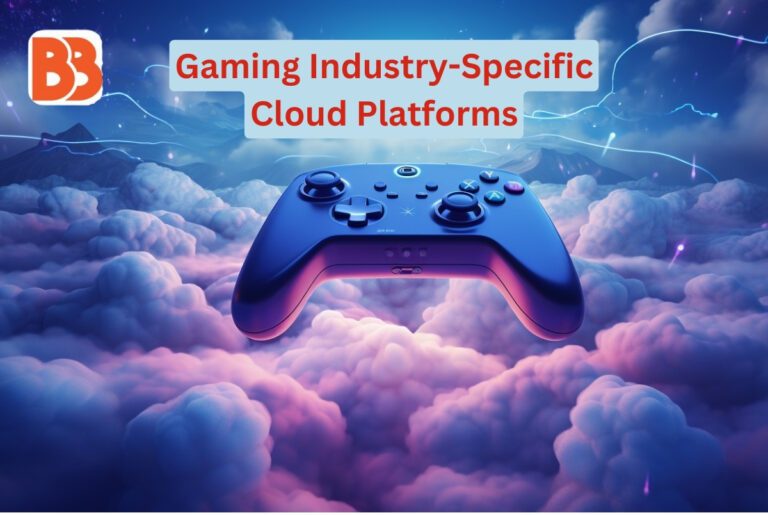The gaming industry Specific cloud platforms are at the forefront of this transformation. The increasing popularity of Massive Multiplayer Online (MMO) games and live-service titles has created a demand for robust, scalable, and reliable cloud platforms tailored specifically for gaming. These platforms are the backbone of modern multiplayer gaming experiences, offering seamless connectivity, reduced latency, and a host of other features that enhance gameplay. Let’s dive into this article to explore the significance of industry-specific cloud platforms for gaming, their impact on massive multiplayer experiences, and the technology driving this exciting era of gaming innovation.
The Need for Gaming-Specific Cloud Platforms
Massive Multiplayer Online games like World of Warcraft, Fortnite, and Call of Duty: Warzone require infrastructure capable of handling millions of concurrent players. Traditional server setups often struggle with the demands of high player counts, dynamic game worlds, and real-time updates. This is where cloud platforms tailored for gaming step in, addressing several critical needs:
- Scalability: MMO games experience fluctuating player activity, with peaks during events or updates. Gaming-specific cloud platforms dynamically scale resources to accommodate these shifts, ensuring smooth performance.
- Low Latency: For online games, even milliseconds of lag can ruin the experience. Cloud platforms with strategically placed global data centers minimize latency for players worldwide.
- Real-Time Processing: Multiplayer games require instant data processing to synchronize game states across players. Gaming clouds handle this with ease, ensuring fairness and consistency.
- Cost Efficiency: By adopting pay-as-you-go models, gaming companies reduce upfront infrastructure costs and only pay for resources they use.
Key Features of Gaming-Specific Cloud Platforms
Gaming clouds are designed with unique capabilities that cater to the demands of massive multiplayer experiences:
- Multiplayer Game Servers: Cloud platforms host multiplayer game servers that manage matchmaking, player data, and in-game logic.
- Cross-Platform Play: With the rise of cross-play between consoles, PCs, and mobile devices, cloud platforms provide the tools to unify gameplay experiences across platforms.
- AI and Machine Learning Integration: AI-driven analytics optimize game mechanics by studying player behavior, improving matchmaking algorithms, and identifying cheaters.
- Real-Time Updates: Live-service games rely on constant updates to retain players. Gaming clouds enable developers to deploy patches.
- Streamlined Development: Cloud-based tools like Unity Cloud Build or Unreal Engine Cloud give developers access to remote development environments.
Leading Gaming Cloud Platforms
Several major cloud providers have developed gaming-specific solutions that cater to the unique demands of the industry. Here are some of the most prominent players:
Microsoft Azure PlayFab
PlayFab, a Microsoft Azure service, is a complete backend platform for live games. It offers services like player authentication, matchmaking, in-game economy management, and analytics. Azure’s global infrastructure ensures low latency and high availability for gamers worldwide.
Amazon Web Services (AWS) for Games
AWS provides cloud solutions for game hosting, analytics, and machine learning. Popular among gaming studios, AWS’s GameLift service simplifies the deployment and scaling of multiplayer servers. Games like Valorant and Apex Legends use AWS to deliver high-quality multiplayer experiences.
Google Cloud for Gaming
Google Cloud offers game-specific services like global matchmaking, live analytics, and AI-powered player insights. Its cloud infrastructure is used by titles like Pokemon GO to support millions of concurrent players.
Tencent Cloud
Tencent Cloud, heavily focused on gaming, provides solutions for low-latency gameplay, live-streaming integration, and AI-enhanced player experiences. It’s particularly popular in the Asian gaming market.
Real-World Impact on Massive Multiplayer Experiences
Gaming-specific cloud platforms are not just about infrastructure they enable entirely new possibilities in game design and player engagement.
Persistent Game Worlds
Cloud platforms allow for persistent online worlds where millions of players can interact simultaneously. Games like EVE Online and Black Desert Online create complex ecosystems with economies and alliances driven by player actions.
Massive In-Game Events
Cloud computing enables large-scale events where thousands of players participate simultaneously. For example, Fortnite hosted a live concert by Travis Scott, attended virtually by over 12 million players in real time.
Seamless Global Play
Thanks to global cloud networks, players from different regions can connect without experiencing latency issues. This has made MMOs and competitive eSports games more accessible to players worldwide.
Challenges and Future Developments
Despite their advantages, gaming-specific cloud platforms face challenges such as:
- Bandwidth Demands: Multiplayer games require significant bandwidth, especially in graphically intensive games.
- Data Security: Protecting player data from breaches is a top priority for cloud providers.
- Rising Costs: As games become more complex, the costs of maintaining cloud infrastructure can increase.
Looking ahead, innovations like 5G, edge computing, and AI will further enhance gaming clouds. Edge computing, for example, will bring servers closer to players, reducing latency even further. AI will continue to optimize game mechanics, while 5G will enable faster and more reliable connections for mobile gamers.
Conclusion
Gaming industry-specific cloud platforms have revolutionized massive multiplayer experiences, enabling developers to create scalable, immersive, and engaging games. As technology continues to evolve, these platforms will play an even more critical role in shaping the future of gaming. From persistent online worlds to seamless global play, the possibilities are endless and gamers around the world are the ultimate beneficiaries of this technological leap. By leveraging the power of these cloud solutions, gaming companies can focus on innovation, creativity, and delivering unforgettable experiences for their players.
Read More:
Cockfighting at 18WIN – The Ultimate International Standard Arena
Cloud Gaming in 2024: The Future of Gaming Without Consoles
